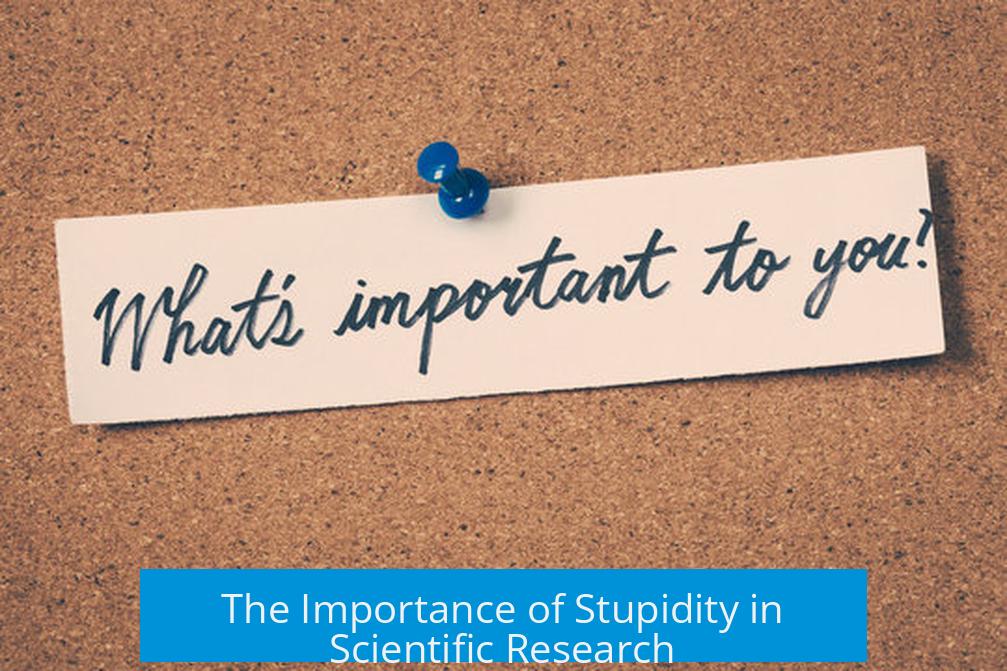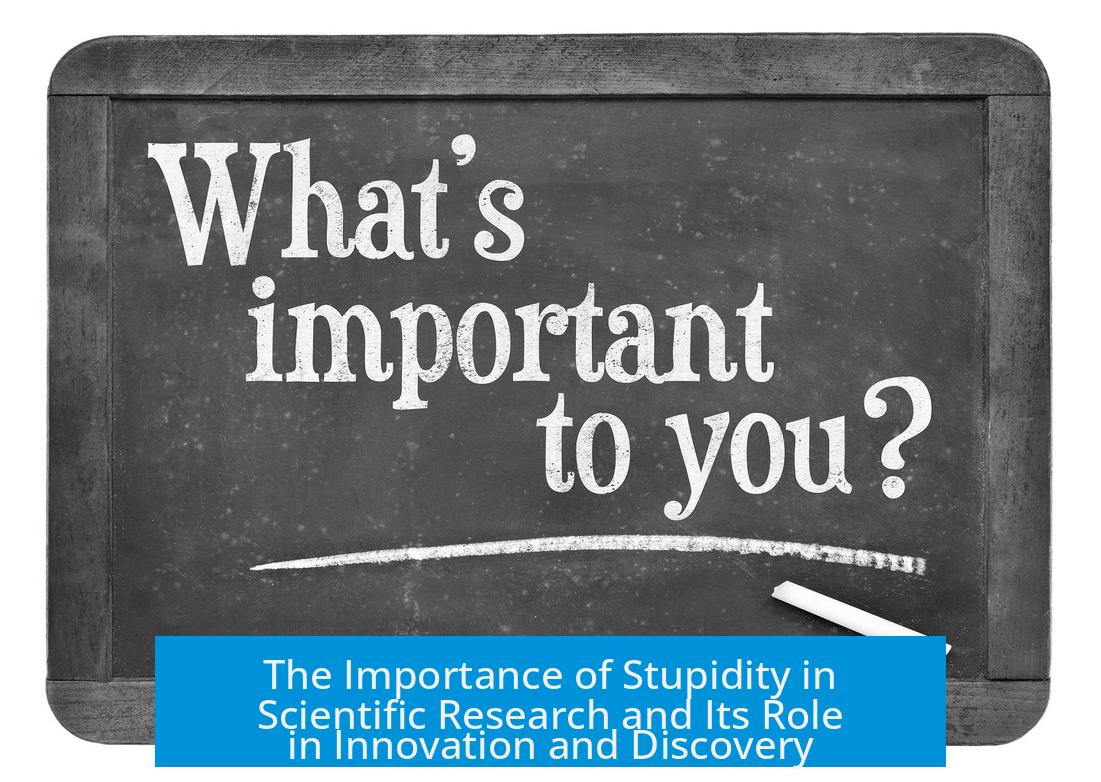The Importance of Stupidity in Scientific Research

Stupidity—or more precisely, the acknowledgment of one’s limitations and ignorance—is essential in scientific research because it fosters curiosity, critical questioning, and continual learning that drives discovery and innovation. Recognizing how much we do not know leads scientists to challenge assumptions, embrace chaos, and refine their understanding of nature. This article explores why feeling “stupid” is normal, the role of ignorance, the value of questioning, and the broader impact on education and culture.
The Feeling of Stupidity as a Normal Part of Scientific Practice
It is common for researchers to doubt their competence, especially during formative phases such as PhD studies. This feeling indicates active engagement with challenging problems rather than incompetence. In fact, some note that if they do not feel “stupid,” they may not be sufficiently pushing boundaries or learning. Exposure to peers with greater expertise can sometimes impact self-esteem but also motivates growth.
Embracing Ignorance to Drive Discovery
The core value lies not in stupidity itself but in embracing ignorance—the vast unknown realms of knowledge. Accepting that one has much to learn opens the door to genuine inquiry and discovery. Scientists acknowledge their relative ignorance but also strive to bridge the gap between current knowledge and their own understanding.
Ignorance here functions as a motivator rather than a limitation. Newly discovered facts replace old assumptions, driven by the constant awareness that what is known is only a fraction of what could be learned. This dynamic keeps research evolving and prevents stagnation.
The Role of Questioning and Challenging Assumptions
Effective scientific practice relies on rigorous questioning and challenging prevailing ideas. This process can seem uncomfortable or even disrespectful in some academic cultures, but robust debate is necessary to ensure the validity of findings.
Research groups that encourage open scrutiny often operate with dynamic discussions, likened to “a pack of hyenas,” where every idea is dissected and tested. This environment helps identify weaknesses in hypotheses and methodologies early, improving the quality of scientific output.
Some scientists prioritize respect and social acceptance over accuracy, which can hinder progress. However, science demands the courage to face criticism and engage with conflicting viewpoints to locate the truth.
The Necessity of Chaos and ‘Stupidity’ in Progress
Progress in science often emerges from chaos and apparent “stupidity.” Disrupting established patterns, even when unconventional or seemingly foolish, can lead to breakthroughs. The metaphor of “hitting phosphorus with a hammer” embodies this willingness to experiment wildly and accept mistakes as part of the process.
Management or leadership roles in scientific environments sometimes appear inept, but such roles may foster the necessary conditions for creativity and risk-taking. This intentional space for disorder allows ideas to be tested and refined, which systematic order alone might stifle.
Educational and Cultural Implications
Understanding the role of “stupidity” in science has important educational consequences. Introducing students, especially at the graduate and high school levels, to the realities of scientific research—including its challenges and the normalcy of feeling lost or inadequate—can prepare them better for the demands ahead.
Innovative courses and resources highlighting this perspective aim to reduce fear and attrition by normalizing struggle and promoting resilience. Some educators advocate for this viewpoint to be integral in graduate school orientations or acceptance materials.
For aspiring scientists, realizing that confusion and doubt are not failures but steps toward competence equips them with realistic expectations for their careers.
The Article’s Impact and Reception
Discussions emphasizing the importance of embracing “stupidity” in science have resonated broadly. Articles and essays tackling this subject gain praise for honesty and insight, with some even becoming motivators displayed in research labs or offices.
Many researchers express regret at not encountering such candid advice earlier in their training, suggesting widespread relevance. The openness of tone and relatable language contribute to its popularity within academic and student communities.
Publication Style Considerations
Typically, scientific publications avoid the first-person narrative, preferring impersonal styles. However, some influential writings about scientific practice break this convention. Personal reflections can connect better with readers, making scientific struggles more accessible and validating shared experiences.
This stylistic choice emphasizes communication and community-building alongside formal dissemination of knowledge.
Concerns Around Null Results and Scientific Culture
One dimension of scientific “stupidity” relates to how the culture treats null results. A dearth of published null findings can distort scientific literature, hinder transparency, and mislead researchers about the likelihood of certain hypotheses. Acknowledging and sharing these “failures” is part of embracing ignorance and ignorance-fueled growth.
Encouraging publication of null or negative results aligns with broader values of honesty and openness in research. It counters pressure to appear always successful, which could suppress genuine inquiry.
Key Takeaways
- Feeling “stupid” during scientific work reflects engagement with complex, evolving questions judged by nature.
- Embracing ignorance motivates ongoing learning and discovery, preventing intellectual stagnation.
- Rigorous questioning—including challenging peers and assumptions—is central to scientific progress.
- Creativity often requires chaos and the willingness to make mistakes, perceived as “stupidity.”
- Educators should prepare students for uncertainty and struggle inherent in research careers.
- Personal reflections on scientific challenges enhance communication and community support.
- Publishing null results is part of honest science and should be encouraged to reflect true knowledge boundaries.
Q1: Why do scientists often feel “stupid” during their research?
Scientists feel stupid because they face nature’s complexity directly. This feeling is common, especially during graduate studies. It reflects the challenge of understanding the unknown, not a lack of ability.
Q2: How does embracing ignorance help scientific discovery?
Accepting ignorance means recognizing there is much to learn. This mindset motivates scientists to explore and question. It drives the pursuit of new knowledge and reduces the gap between what we know and what we don’t.
Q3: What role does questioning assumptions play in science?
Asking tough questions challenges ideas and tests their validity. Scientific groups that encourage scrutiny improve their work. This ensures conclusions are well supported, even if it feels uncomfortable.
Q4: Why is chaos or “stupidity” necessary in science?
Chaos can spark creativity and breakthroughs. Sometimes, disruptive or unorthodox actions lead to progress. Allowing space for mistakes and confusion helps science evolve over time.
Q5: How should education prepare students for the feeling of stupidity in research?
Students should be told early that feeling lost or “stupid” is normal in science. This prepares them emotionally and intellectually. Introducing this idea can reduce frustration and encourage persistence.





Leave a Comment